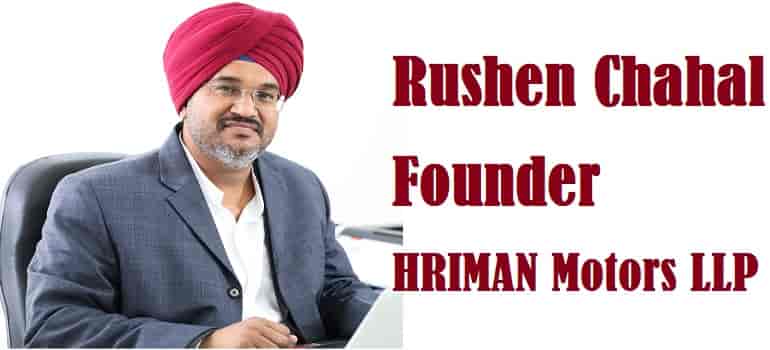
Q. Dear Rushen Chahal thank you for your time, please tell our readers what made an academician to dive into auto making business, what was the idea behind starting HRIMAN Motors LLP?
A. We started working on a solid battery solution/pack for India from the emerging technologies three years ago and when we had the pack ready – fully done we decided to look for applications, the most obvious was the mobility domain.
EV’s need very different packaging and the cooling systems of the batteries too need to be managed as per the Indian environment. There are no battery packs globally that can fully meet the challenges thrown by the Indian climate.
Q. Please share in detail about your company, its operations and products.
A. We are working on developing a 2 seater car and a 4 seater bus.
Q. What were the challenges you faced/facing while working on the project?
A. Changing regulations over the last three years have been a major challenge and still we are not sure with 100% certainty that more changes will not come in till we launch.
Q. You recently announced to launch two-seater electric car “RT90”, Can you shed some light on the features and USP of the car (beside the battery)and also its on road price?
A. The RT90 will be a state of art vehicle – good to go in 25 countries without any modifications. We are looking at two battery packs – an LFP and an LTO. Both packs offer good options for the price.
Q. You have been touting about the life of batteries to be used in your cars, can you please tell us more about it and advantages of LTO Cells. What about the recycling process of these cells?
A. The lifecycle of our LTO packs is 14 to 15000 compared to about 500 for lead acid and 2000 for lithium ion.
Even if you charge it daily the battery – in theory will last you 40 years – in practice looking at all other aspects – atleast 20 years – which is far greater than the life of the car. The bottom line – consumers will never have to worry about changing their battery ever if they buy our cars – for all other cars which do not offer this technology – they will have to spend atleast 200USD per KW equating to about 2.5 lacs per car, whenever they have to go for a battery replacement.
Q. When can we see these two-seater electric cars commercially available, any specific date that you would like to share with our readers?
A. We are aiming for a Diwali launch.
Q. Beside the two-seater electric car what are the other projects you are currently working on and when can we see the launch of these vehicles?
A. We are also working on a 4 seater bus – it will have a state of the art air filtration system and will ensure that the passengers always sit in an environment with AQI level under 100.
Q. Currently India has about 6,000 electric cars and government of India is aiming to become 100 percent electric vehicle nation by 2030, do you think it is an achievable target?
A. No, it is highly unlikely that any of the government targets will be achieved. The current budget, where EV’s got little attention clearly shows where the policy is headed.
Q. To keep these EVs running on road how many charging stations does the country need?
A. Only Delhi needs over one lac charging stations within 5 years.
Q. What is the major hurdle to EV adoption and how can it be sorted out?
A. The Government needs to set up a specific body – similar to DMRC to make EV’s happen.
Q. What role will EVs play in achieving a de-carbonized future and climate Change?
A. We have stated that every car we put on the road – the carbon foot print will be zero. To do this all we need is license to sell green power. We await the inputs from relevant authorities.
Q. What’s it really going to take for EV to go mainstream and how long?
A. EV’s will never be more than 60% of the total market. Even if we achieve 20 % share of the total- we would have achieved a major milestone. To do this – the government needs to streamline GST and Import duties for EV components and batteries.
Q. Finally-EV industry (particularly Indian companies) seems to be worried about the rise of hydrogen fuel, do you think it is just propaganda or is it seriously going to impact EV market?
A. Hydrogen fuel is not a fuel for the masses. Managing hydrogen in a mass consumer market is almost impossible and the cost of generating vs benefits obtained are also debatable.
( This interview was originally published in February issue of Climate Samurai)
ALSO READ:
Manu Kumar, Head of Marketing, Hero Electric Vehicles PVT. LTD
Awadhesh Kumar Jha, Vice President, Charge & Drive & Sustainability, Fortum India

